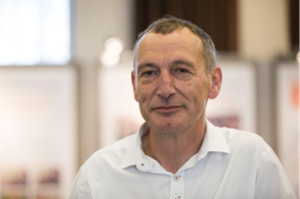NEWS
All the latest news and views from Bild.
16 June 2022
What does good PBS look like?

Professor Edwin Jones, Bild PBS Strategic Lead, shares his thoughts on co-production in PBS and introduces Bild’s new ‘What does Good PBS look like?’ resource.
Positive Behaviour Support at Bild
At Bild, a key part of our work is helping support providers and practitioners, to better understand each person they support and meet their individual needs. The approaches we promote are person-centred, and advocate for the full involvement of the person in co-designing and making decisions about the support they receive. One of the ways we do this is training practitioners and providers in Positive Behaviour Support, known as PBS.
PBS is a framework containing many elements of good practice – including upholding human rights, trauma informed approaches, inclusive communication, building rapport, sensory issues, behavioural science and others – that helps us understand how to best support someone.
Bild’s PBS is values-led and focusses on getting to know people really well and building great relationships. By doing this, it is easier to understand the kind of support that helps someone to thrive. Knowing someone’s needs, preferences, hopes and wishes help us understand how to provide good support and to recognise when we’re not getting things right.
PBS uses behavioural science to helps us understand what someone might be trying to tell us through their behaviour. Behaviour means our actions, or what we do for most of the time. Most behaviour has meaning and is a way of communicating, it can give us clues about what is going on for the person, especially for people who do not communicate verbally. Sometimes a person’s behaviour could be telling us that something is not right for them, or that they are distressed in some way.
By putting together what we can see with what we know about the person, we can try and understand any difficulties they might be having and how to better support them, making adaptions to the environment and the support provided to ensure the person’s needs are met. Bild is clear that the use of crude behavioural approaches such as punishment or doing other things to people that they do not like is unethical and has no place in PBS. We also believe that PBS has evolved and will continue to change, as we develop good practice with people with lived experience.
Support should be regularly reviewed to ensure it’s still working for the person and decision making should include the supported person, their family, and the people who work with them on a daily basis, such as support staff, to ensure the supported person’s choices, preferences, feelings and emotions are listened to and acted upon. There are some good examples of this sort of co-production, and in recent times it is discussed and recommended more, but it has not always been a feature of all PBS practice. Bild wants to see co-production at the heart of PBS, and to help people better co-produce, because this will help PBS evolve further. To do this we have to ask who should have the power? And we must help ‘professionals’ give power back to people, not take it away. This may not always be easy, but at Bild we believe it is possible.
Concerns about PBS
We know that some people are concerned that PBS is similar to Applied Behaviour Analysis (ABA). At Bild, we are clear that PBS and ABA are not the same thing. The NAS has published a helpful statement highlighting differences between ABA and PBS. Our PBS approach does not try to change people or their behaviour, rather it seeks to improve people’s environments and support to improve their quality of life and better meet their needs. We try to ‘fix’ environments, not people.
We know that things are often labelled as PBS that aren’t really PBS at all. Sometimes poor-quality services simply relabel what they do as PBS, without changing their practices or attitudes. We know that there are people who have had bad experiences with this type of support. We agree with many of the criticisms about these practices and share concerns about services where people’s rights, choices and preferences are not respected. Our work seeks to challenge poor practice, embedding rights-based, values-led culture, with supported people at the heart.
Promoting best practice in PBS
At Bild, we do all we can to ensure that practitioners we train, embody and champion Bild’s PBS approach. This approach promotes respect, dignity, and full, uncompromising inclusion in all areas of life. Every person is entitled to the same rights and freedoms as everyone else. If this isn’t happening, then – quite simply – they are not experiencing values-led PBS.
We wanted to make it easier to recognise when good PBS is happening – and when it isn’t. Together with the PBS Alliance, we have recently developed a new resource “What Does Good PBS Look Like?”
This will help people, families, practitioners, providers, and inspectors, identify if PBS is being done well.
We think there are some very good things within the PBS framework but are always considering how it can be improved and our vision is to continue working with people with lived experience to do this. This will continue to ensure that we are helping practitioners and providers to better understand each person they support, meet their individual needs and support them to live the life they want.
Bild’s upcoming International PBS Conference – Co-production: Giving the Power Back, offers an opportunity to further explore how we do this, what we can learn from people’s experiences and encourage others working in health and social care to consider power dynamics and the importance of co-production.
If you would like to share your views or comments, you can contact me at [email protected]
